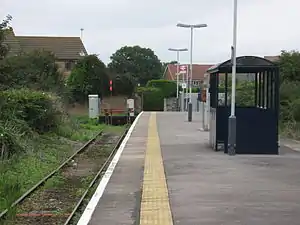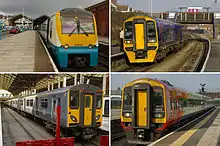Severn Beach railway station
Severn Beach railway station serves the village of Severn Beach, England. This is the terminus of the Severn Beach Line.
 | |
| Location | Severn Beach, South Gloucestershire England |
| Coordinates | 51.5598°N 2.6642°W |
| Grid reference | ST540847 |
| Managed by | Great Western Railway |
| Platforms | 1 |
| Other information | |
| Station code | SVB |
| Classification | DfT category F1 |
| History | |
| Original company | Great Western Railway |
| Key dates | |
| 5 June 1922 | Opened (as excursion platform)[1] |
| 26 May 1924 | Fully opened[1] |
| 9 July 1928 | Passenger services extended to Pilning[1] |
| 10 September 1963 | Closed to goods traffic[1] |
| November 1964 | Line to Pilning closed to passengers[1][2] |
| July 1968 | Line to Pilning closed completely[1] |
| Passengers | |
| 2015/16 | |
| 2016/17 | |
| 2017/18 | |
| 2018/19 | |
| 2019/20 | |
| Notes | |
Passenger statistics from the Office of Rail and Road | |
This station is 13.5 miles (21.7 km) north west from Bristol Temple Meads on the Severn Beach Line. The station is managed by Great Western Railway, who are also the sole provider of trains serving the station.
History
The railway reached Severn Beach in 1900, but was at first used only for goods traffic to Pilning. A platform was built beside the line at Severn Beach by the Great Western Railway in 1922, and a bay platform added to the west for excursion traffic, with terminating passenger services from Bristol starting on 26 May 1924, subsequently extended to Pilning in a loop back to Bristol via Patchway from 9 July 1928.[1] By 1924 a brick concourse had been built perpendicular to the bay platform, providing a ticket office, the station master's office, toilets and a ladies' waiting room. The station master and keeper of the level crossing were also provided with houses, while to the east of the platform were sidings, primarily for stabling of excursion trains.
In November 1964 through services to Pilning ceased,[2] with the line north closed completely in July 1968, although goods traffic at Severn Beach had already ended in 1963.[1]
More recently, services to Severn Beach have been cut back further, with only one in three trains to Avonmouth now continuing on to Severn Beach. The concourse and other station buildings have been demolished, replaced with a small metal and glass shelter, while the eastern rails have been pulled up, leaving just the bay platform remaining. Half of the 240 yards (220 m) is cordoned off, and that which remains dwarfs the two-car diesel multiple units which use it. To the east, the land once used for sidings has become overgrown and a dumping ground for litter and general detritus.
Service

Services at Severn Beach are all terminating services from Bristol Temple Meads, operated by Great Western Railway using mainly Class 166 Turbo units. Monday to Friday, three trains every two hours run from Temple Meads to Avonmouth, with one extended to St Andrew's Road and Severn Beach, giving a service roughly every two hours, the first arriving around 6am and the last departing Severn Beach about 11pm. On Saturdays more trains continue, with either a replacement bus service or train each hour, with more trains in the evening.
Sunday sees an hourly service in the summer months (May to mid-September), but just two departures in the winter (most services terminating at Avonmouth)[3]
| Preceding station | Following station | |||
|---|---|---|---|---|
| Terminus | Great Western Railway Severn Beach Line |
St Andrews Road | ||
| Disused railways | ||||
| New Passage Halt | Great Western Railway Severn Beach Line |
St Andrews Road | ||
Future

Great Western Railway declined a contractual option to continue the Greater Western passenger franchise (of which services at Severn Beach are a part) beyond 2013, citing a desire for a longer-term contract due to the impending upgrade to the Great Western Main Line.[4] The franchise was put out to tender,[5][6][7] but the process was halted and later scrapped due to the fallout from the collapse of the InterCity West Coast franchise competition.[8] A two-year franchise extension until September 2015 was agreed in October 2013,[9][10] and subsequently extended until March 2019.[11][12][13]
With the coming upgrade to the Great Western Main Line, the main line from London to Bristol is due to be electrified by 2016.[14] However, the electrification will not extend beyond the main lines, so Severn Beach will continue to be served by diesel trains.[15] Stephen Williams, MP for Bristol West, questioned whether electrification could continue to Clifton Down. Then-Secretary of State for Transport Philip Hammond replied that it would have to be looked at in the future.[16] The group Friends of Suburban Bristol Railways supports the electrification of the entire Severn Beach Line.[17]
Improved services at Severn Beach are called for as part of the Greater Bristol Metro scheme, a rail transport plan which aims to enhance transport capacity in the Bristol area.[18][19] There is an aspiration for half-hourly services, however due to the large sections of the Severn Beach Line which are single-track and to the congested main line from Temple Meads, such frequency is not currently feasible.[20][21] The scheme was given the go-ahead in July 2012 as part of the City Deal, whereby local councils would be given greater control over money by the government.[22]
References
| Wikimedia Commons has media related to Severn Beach railway station. |
- Oakley, Mike (2003). Gloucestershire Railway Stations. The Dovecote Press. pp. 118–120. ISBN 1-904349-24-2.
- History of the Severn Beach Line
- GB National Rail Timetable 2013, Table 133 - 20 May to 6 December 2013Network Rail; retrieved 2013-09-27
- "First Great Western bids for longer rail franchise deal". BBC News. 11 May 2011. Retrieved 27 April 2012.
- Haigh, Philip (18 April 2012). "First leads a field of seven bidding for rail franchises". RAIL magazine. Peterborough: Bauer Media (694): 8–9.
- "Great Western franchise to be extended". Railnews. 19 July 2012. Retrieved 19 July 2012.
- "New Great Western franchise to deliver new express trains" (Press release). Department for Transport. 27 July 2012. Retrieved 29 July 2012.
- "Great Western London to south Wales rail contest scrapped". BBC News. BBC. 31 January 2013. Retrieved 31 January 2013.
- "First celebrates last-minute Great Western deal". Railnews. 3 October 2013. Retrieved 4 October 2013.
- "First Great Western retains Wales and west rail franchise". BBC News. BBC. 3 October 2013. Retrieved 4 October 2013.
- "First Great Western offered new franchise deal". BBC News. BBC. 10 October 2014. Retrieved 10 October 2014.
- "FirstGroup wins Great Western contract extension". The Guardian. Guardian Media Group. 10 October 2014. Retrieved 10 October 2014.
- "Updated franchise schedule signals GW extension". Railnews. 10 October 2014. Retrieved 10 October 2014.
- "Modernising the Great Western" (PDF). Network Rail. Archived from the original (PDF) on 13 April 2013. Retrieved 9 June 2012.
- "Bristol to London line to be electrified". This is Bristol. Northcliffe Media. 23 July 2009. Retrieved 5 April 2012.
- "Benefits of Bristol to London high-speed rail link 'must go beyond just mainline'". This Is Bristol. Northcliffe Media. 3 March 2011. Retrieved 5 April 2012.
- "FoSBR Newsletter" (PDF). Friends of Suburban Bristol Railways. Autumn 2011. Retrieved 9 April 2012.
- White, James (13 March 2009). "Item 04: Greater Bristol Metro" (PDF). West of England Partnership. Retrieved 28 December 2011.
- "Campaign for trains from Bristol Temple Meads every half hour". This is Bristol. Northcliffe Media. 17 January 2012. Retrieved 19 January 2012.
- "Transport Minister hears calls for better Bristol train service". This is Bristol. Northcliffe Media. 17 October 2009. Retrieved 14 April 2012.
- "Our Case". Friends of Suburban Bristol Railways. Retrieved 15 April 2012.
- Ribbeck, Michael (6 July 2012). "£100 million Bristol Metro train network by 2016". The Post, Bristol. Northcliffe Media. Retrieved 6 July 2012.